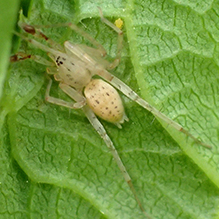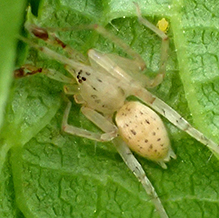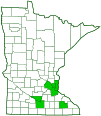long-legged ghost spider
(Wulfila saltabundus)
Conservation • Description • Habitat • Biology • Distribution • Taxonomy
|
|
||||||||||||||
Description |
Long-legged ghost spider is a small wandering spider. It occurs in the United States and southern Canada east of the Great Plains. Adults are active from mid-April through late August. They are found on the foliage of trees and shrubs and in plant litter. Females attach their egg sacs to the undersides of leaves. Females are ⅛″ (3.7 to 4.2 mm) in length. Males are a little smaller, ⅛″ (2.9 to 3.5 mm) in length. The body is pale yellow, yellowish-white, or white (pale) with gray or grayish green (dark) streaks and spots. The cephalothorax (front part of the body), consisting of the head and thorax, is oval and longer than wide. The carapace (upper side) is widest in the middle, near the attachment of the second and third pairs of legs. It has a dorsal groove (a longitudinal depressed area) near the center. The surface is sparsely covered with short, recumbent setae (hairs). There are eight moderately large eyes arranged in two rows of four. The anterior (front) row is nearly straight. The AME (anterior median eyes) are smaller than the ALE (anterior lateral eyes). The posterior (rear) row is procurved. If a straight line was drawn through the PME (posterior median eyes), the PLE (posterior lateral eyes) would be in front of the line. The PME and PLE are about the same size. All of the eyes are narrowly ringed with black. The chelicerae (the mouthparts corresponding to the jaws) are short, slender, and pale. Each fang rests in a furrow between two margins. The promargin (outer margin) has four to six teeth. The retromargin (inner margin), closest to the mouth, has six to eight teeth. A narrow, dark band on the lateral margins of the carapace is broken into a series of four short dashes. A series of streaks radiating from the dorsal groove is also reduced to single short dashes. There are two short, dark, longitudinal lines behind the PME. The abdomen is long, oval and widest in the middle. It is pale with several curved, transverse rows of small dark spots. The surface is covered with short, pale setae, and there is a cluster of long, curved, erect setae at the front. The breathing pore at the tip of the abdomen (tracheal spiracle) is located halfway between the genital groove and the spinnerets. The legs are thin, pale, and long. The front pair are very long, twice as long as the body or longer on the female, three times as long as the body on the male. This is the feature that gives the species the first part of its common name. |
Size |
Female Body Length: ⅛″ (3.7 to 4.2 mm) Male Body Length: ⅛″ (2.9 to 3.5 mm) Legspan: unknown |
Web |
| None |
Similar Species |
Habitat |
|
Biology |
Season |
Mid-April through late August |
Behavior |
|
Life Cycle |
|
Food |
|
Distribution |
||
|
Sources |
|
| 7/6/2025 | ||
Occurrence |
||
|
||
Taxonomy |
|
Class |
|
Order |
|
Suborder |
Araneomorphae (Typical Spiders) |
Infraorder |
Entelegynae |
Zoosection |
RTA clade (RTA Clade Spiders) |
Zoosubsection |
Dionycha clade spiders |
Family |
Anyphaenidae (ghost spiders) |
Subfamily |
Anyphaeninae |
Genus |
Wulfila |
Subordinate Taxa |
|
|
|
Synonyms |
|
Anyphaena saltabunda Anyphaenella saltabunda Clubiona saltabunda Gayenna saltabunda |
|
Common Names |
|
long-legged ghost spider |
|
Glossary
Carapace
The hard, upper (dorsal), shell-like covering (exoskeleton) of the body or at least the thorax of many arthropods and of turtles and tortoises. On crustaceans, it covers the cephalothorax. On spiders, the top of the cephalothorax made from a series of fused sclerites.
Cephalothorax
The front part of the body of various arthropods, composed of the head region and the thoracic area fused together. Eyes, legs, and antennae are attached to this part.
Chelicerae
The pair of stout mouthparts, corresponding to jaws, in arachnids and other arthropods in the subphylum Chelicerata.
Seta
A stiff, hair-like process on the outer surface of an organism. In Lepidoptera: A usually rigid bristle- or hair-like outgrowth used to sense touch. In mosses: The stalk supporting a spore-bearing capsule and supplying it with nutrients. Plural: setae. Adjective: setose.
Visitor Photos |
||
Share your photo of this arachnid. |
||
This button not working for you? |
||
Babette Kis |
||
Wulfila saltabundus (long-legged ghost spider) I don't often see these spiders, and when I do, it's usually on the underside of leaves. On June 20, 2025, at Barnes Prairie, Racine Co., WI, I found a long-legged ghost spider, Wulfila saltabundus, on the underside of a leaf. The spider was about 10mm long, including the legs. A couple of photos are attached. |
||
 |
 |
|
MinnesotaSeasons.com Photos |
||
|
||
|
||

Slideshows |
|

Visitor Videos |
||
Share your video of this arachnid. |
||
This button not working for you? |
||
|
Other Videos |
||
|

Visitor Sightings |
||
Report a sighting of this arachnid. |
||
This button not working for you? |
||
MinnesotaSeasons.com Sightings |
||
|

|
Created: 7/6/2025 Last Updated: © MinnesotaSeasons.com. All rights reserved. |

